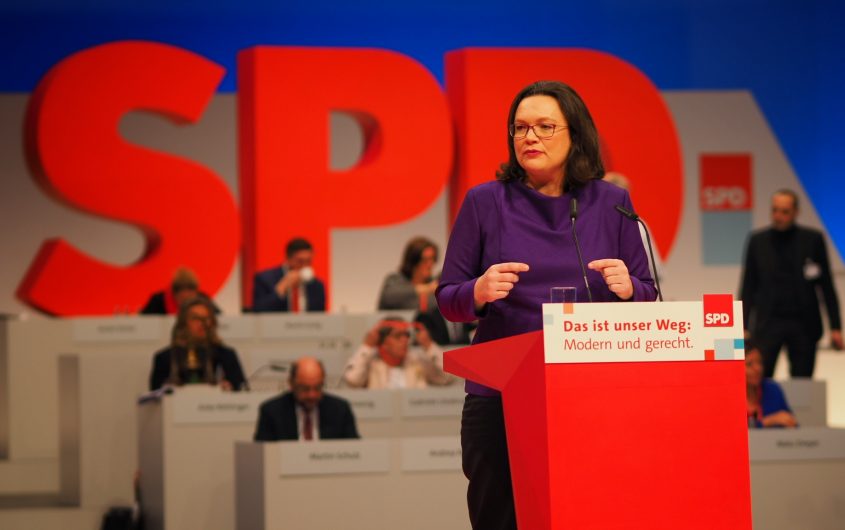
SPD Schleswig-Holstein via Flickr
The End of a Not-So-Grand Coalition

Stephen F. Szabo
Senior Fellow
Dr. Stephen F. Szabo is a Senior Fellow at AICGS, where he focuses on German foreign and security policies and the new German role in Europe and beyond. Until 2017, he was the Executive Director of the Transatlantic Academy, a Washington, DC, based forum for research and dialogue between scholars, policy experts, and authors from both sides of the Atlantic. Prior to joining the German Marshall Fund in 2007, Dr. Szabo was Interim Dean and Associate Dean for Academic Affairs and taught European Studies at The Paul H. Nitze School of Advanced International Studies, Johns Hopkins University. He served as Professor of National Security Affairs at the National War College, National Defense University (1982-1990). He received his PhD in Political Science from Georgetown University and has been a fellow with the Alexander von Humboldt Stiftung, the Woodrow Wilson International Center for Scholars, and the American Academy in Berlin, as well as serving as Research Director at AICGS. In addition to SAIS, he has taught at the Hertie School of Governance, Georgetown University, George Washington University, and the University of Virginia. He has published widely on European and German politics and foreign policies, including. The Successor Generation: International Perspectives of Postwar Europeans, The Diplomacy of German Unification, Parting Ways: The Crisis in the German-American Relationship, and Germany, Russia and the Rise of Geo-Economics.
The abrupt resignation of Andrea Nahles as chair of the Social Democratic Party (SPD) is another sign that the Grand Coalition government is a zombie, still walking but otherwise quite dead. This unloved government was the result of Christian Lindner’s pique when he pulled his Free Democrats (FDP) out of the negotiations with the Christian Democrats and Greens in late 2017. The Social Democrats were then dragged into another coalition with Angela Merkel, something they had long resisted with good reason. It is now clear that this was a fatal error for the SPD and for German leadership.
Everyone except the Alternative for Germany (AfD) and the Greens lost as a result. The AfD came to life just as the Extra Parliamentary Opposition or APO did during the Grand Coalition of the 1960s but, unlike other extreme right-wing parties like the NPD and Republikaner, has become a fixture in the party landscape. While the AfD may have maxed out its support level at 14 percent nationally (albeit much higher in eastern Germany), the result is not only an increase of anti-foreigner and anti-Semitic sentiment, but a six-party system that has paralyzed German politics and made it much uglier.
The Social Democrats are now, in Kurt Kister’s phrase, a milieu party without a milieu. Its working-class base has shrunk and much of it has moved to the Greens, die Linke, and the AfD. It has been eclipsed on the left and center by the Greens. It even lost in its stronghold of Bremen in the recent election there, not to mention its abysmal results in the recent European Parliamentary election. For a party that produced Willy Brandt, Helmut Schmidt, and even Gerhard Schröder, its lack of any credible, let alone dynamic, leaders is both surprising and fatal. When Brandt resigned, Helmut Schmidt was in the wings; since Schröder, it has lacked serious and appealing leaders. The party had to pick three people with the regrettable title of commissars as temporary replacements for Nahles, another sign of the leadership deficit of a party without any young leaders coming up the ranks and tied to an unhappy coalition with Merkel.
The Christian Democrats (CDU/CSU), while in better shape, are now below 30 percent in the polls and in the midst of a leadership struggle. Annegret Kramp-Karrenbauer (AKK) is the presumed successor to Merkel—with emphasis on the presumed. The poor showing of the party in the European Parliamentary election and her clumsy handling of the response to Macron’s call for a renewal of the Franco-German relationship and to the Rezo anti-CDU YouTube rant has unsettled her party. With the prospect of more losses in the upcoming state elections in eastern Germany this fall and of a break up of the federal coalition, she will face serious challenges to her leadership from Jens Spahn, Armin Laschet, and Friedrich Merz. The broader public does not know if she is ready to take on the chancellor’s office and it seems she may not have much time left to establish herself as a credible national leader.
Lindner’s gamble to pull out of a Jamaica coalition in 2017 is now seen by him and his party, the Free Democrats (FDP), as a miscalculation. The FDP is far down in the polls, tracking about as much support as die Linke. Lindner missed his chance as the leader of the second largest party in a Jamaica coalition government to be finance minister and reestablish his party as a serious governing partner. If new elections are called this year, the FDP will be the smallest party in a Jamaica government.
The Greens are riding high and are either the first or second party among the public, even opening up the prospect of a Green chancellor. They are benefiting from defections on the left from the SPD and the right from the CDU, which is now seen as moving to the right to co-opt AfD voters. They are polling well with younger voters and with pro-European Germans.
Given all this turmoil, here are the most likely scenarios moving forward:
New elections this year: This is the most likely prospect. While the CDU/CSU, and especially Angela Merkel, want desperately to avoid an early election given the party’s low standing in the polls and its uncertain future leadership, the SPD base and most of its leadership wants out. They are in a desperate state and cannot afford another two years of being tied to a do-nothing government led by a lame duck chancellor. The SPD is facing the real prospect of continued losses in the fall state elections. If the SPD decides either at a meeting of its leadership on June 24 or at a special party congress this fall to pull out, there is little incentive for the Greens or the FDP to want to support a Merkel government. This rules out any chance of a Jamaica coalition before the 2021 election because the Greens have no incentive to serve as a minor party under a CDU chancellor. For this reason, a minority government is also unlikely as none of the other parties have an incentive to support an all-Christian Democratic government. Therefore, look for a Bundestag election late this fall or in early winter.
Continuation of the Grand Coalition: The SPD might decide to hold on for the full term as an early election would probably be a disaster for them. In addition, there is the “limousine factor” for those serving in ministerial posts who will lose their perks—with almost no prospect of a return to power for a long time. No more foreign and finance ministries and no voice on policies that remain important to the base. The party might also benefit from Merkel fatigue with a lame duck chancellor in power in name only. This seems an unlikely long-term option and there are signs that the coalition is pushing for a number of quick legislative achievements on immigration, health care, and pensions to demonstrate its continuing relevance or to bank some gains before going to the polls later this year.
What is best for Europe? As Anna Sauerbrey and other observers of the German political scene have pointed out, a change of leadership in Germany is needed by Europe and the larger West. The Franco-German engine has stalled to the point that French president Emmanuel Macron is frustrated with the lack of any leadership from Berlin and is now trying to shape a coalition to block the naming of a German to a key leadership post in the new European Union constellation, including Commission president and head of the European Central Bank. Chancellor Merkel seems content giving admirable speeches with no real follow up. She is clearly tired and burned out. A renewed German government with some key leaders from the younger generation could partner with France and others on a European renewal. It could regain the lead it has lost on climate change and move forward with much-needed infrastructure modernization and digitalization as well as taking a new look at defense. It could energize the German political debate, which is now overly mired in stagnant consensus politics. It can’t be worse than the stasis of a zombie government.








